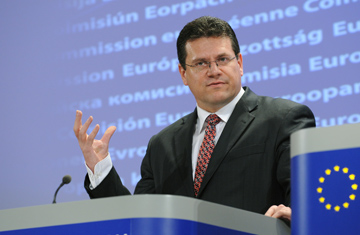
E.U. commissioner for Inter-Institutional Relations and Administration Maros Sefcovic gives a press conference on the European Citizens' Initiative
What do Europeans really want? Lower taxes? Longer holidays? More chocolate? We may soon find out thanks to a new innovation in the European Union: citizens' initiatives.
Meant to bring everyday Europeans closer to the E.U. institutions that govern them in distant Brussels, the direct democracy experiment allows citizens to sling their concerns onto the E.U. agenda. The principle is simple: if campaigners muster 1 million signatures for a proposal, they can ask the European Commission, the E.U.'s executive branch, to write new legislation. "This is all about taking the E.U. outside of the Brussels beltway and giving it full democratic expression," said Maros Sefcovic, the E.U. commissioner in charge of putting the proposal into place. "The E.U. often stands accused of complexity and detachment from its citizens. Fostering a lively cross-border debate about what we are doing in Brussels will lead to better rule-making, inspired by the grass roots."
Last week, the commission published rules for the citizens' initiatives, saying that the 1 million names would have to come from at least nine of the E.U.'s 27 member states. There are no restrictions, however, on how people can collect signatures, be it in the street or on social-networking sites like Facebook or Twitter. Once the signatures are in, the commission has four months to either accept the initiative by drafting a proposed law to go before the E.U. Parliament, or reject it. Petitions can be killed off if the commission finds them outside its remit, or if they are "manifestly against the fundamental values of the E.U." Sefcovic also included safeguards to prevent "silly" initiatives from being proposed or extremists from hijacking the process.
The E.U. plan does not go as far as other direct democracy systems in Switzerland or California, where citizens can pass regulations via ballot initiatives or referenda. But in some ways, it will likely be easier for E.U. residents to propose new laws. One million signatures sounds daunting, but that's just 0.2% of the E.U.'s total population. By contrast, Swiss initiatives require signatures from about 2% of the population to trigger a national vote. And in an age when musicians from Coldplay to Lily Allen have millions of followers on Twitter and Facebook, collecting 1 million names could be a snap.
The new system has received a cautious welcome from Europeans. A group representing thousands of non-governmental organizations, including Greenpeace, the European Trade Union Confederation and the European Women's Lobby hailed it as "an important new step to increase public participation in E.U. decision-making."
But direct democracy campaigners are split on its merits. Bruno Kaufmann, president of the Initiative and Referendum Institute Europe think tank, welcomed the move, saying "it will force people to reflect on how Europe really works." But Carsten Berg, coordinator of the European Citizens' Initiative, an organization advocating more direct democracy in the E.U., warned that the "intrusive personal data requirements, narrow topics and unclear follow-up could render it unusable." And Janis Emmanouilidis, an analyst at the European Policy Center, a Brussels-based think tank, believes it could backfire. "One million people is a low threshold and it risks falling prey to a 'tyranny of minorities' backed by resourceful and well-organized interest groups," he says.
His ambivalence is shared by George Schopflin, a Hungarian member of the European Parliament. "It is hard to think what subject might be suitable [for citizens' initiatives]," he says. "Many E.U. issues are unspeakably complicated. And many others that might engage European citizens, like whether we should all drive on the right, are too absurd for the commission to address."
And for all the talk of stirring democracy, critics say the experience of such schemes in places like California and Switzerland shows that some initiatives fail to generate reasoned debate and open participation. Jean-Thomas Leseuer, head of the Thomas More Institute, a Paris-based think tank, says citizens' initiatives amount to mere democratic window dressing. "It is not with old tools that we will build Europe," he says. "This proposal is too heavy and complicated to impose on Europe before anything like a European consciousness exists. I bet that there will be very few initiatives."
That may sound cynical and dismissive. But if a passionate European or two manages to collect 1 million signatures, they could prove him wrong.
